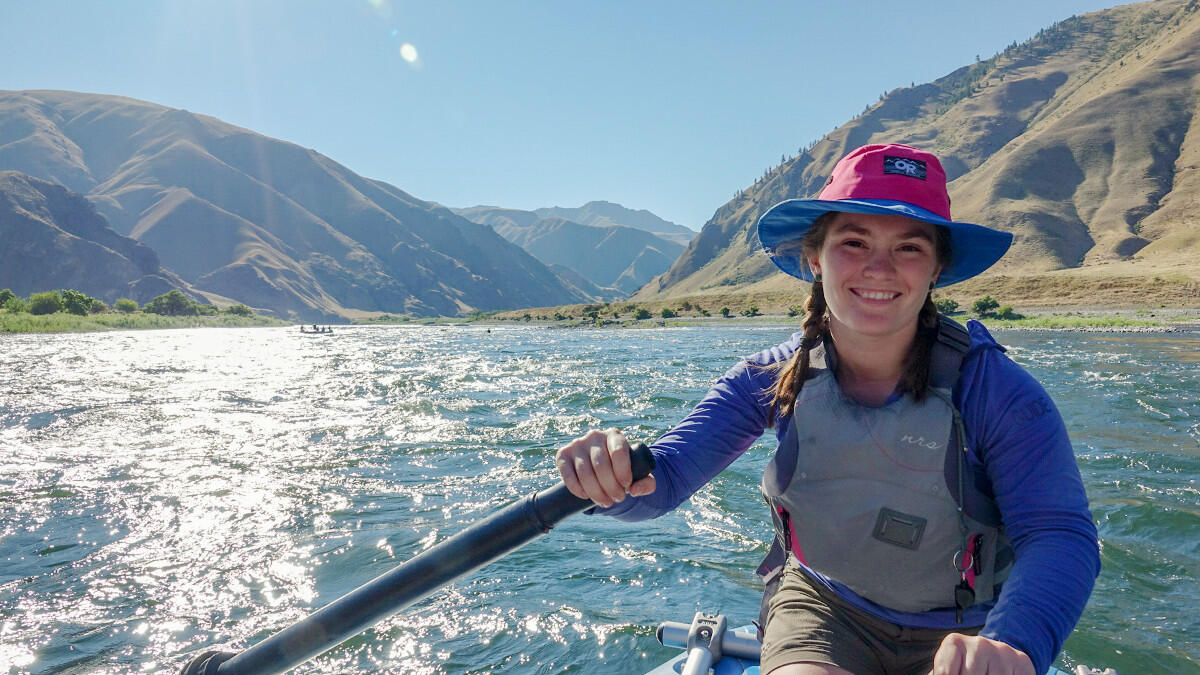
Aug. 2, 2018
How much E.coli is in the James River? Just ask this VCU environmental studies major.
Share this story
When swimmers, boaters or fishermen want to know the E.coli levels of the James River, they check the James River Association’s James River Watch website, which provides river condition data collected by volunteers on water temperature, turbidity, river height and bacteria.
This summer, a Virginia Commonwealth University student is playing a key role in providing that essential data to recreational users of the James River, stretching from Buchanan in the west to Norfolk in the east.
Rachael Moffatt, a senior environmental studies major, is serving as the James River Association’s water quality intern, a role in which she is coordinating the association’s 66 trained citizen-scientist volunteers — known as the “James RiverRats” — and supporting their work to collect samples and upload data on a weekly basis.
“I really, really enjoy it,” Moffatt said. “I spend a lot of time on the river, so it’s really cool to be involved with the water quality monitoring. I can tell people like, ‘Hey, maybe don't put in here, the E. coli levels are a little bit high.’ And directly interacting with something that I love — and would be interested in anyway — and being able to know more about it, it's just cool.”
Ben Watson, staff scientist with the James River Association, said Moffatt has been a great help this summer.
“We brought her on to help with James River Watch, our water quality monitoring program designed to give people a real-time understanding of river conditions,” Watson said. “Rachael already has a lot of ties to Richmond's outdoor community and growing outdoor recreation industry, and those connections have been very helpful. She's a clear communicator and works well with our volunteers across the watershed, and it's very clear she cares a lot about what she does.”
I’m not exactly sure what my career plans are yet, but I'll probably go out West, maybe [be a river] guide for a little bit, then eventually settle into a job where I use my degree. Whatever I do, I'll be focusing on rivers.
Moffatt, who graduates in December, is part of the first cohort of students pursuing a certificate from the River Management Society’s River Studies and Leadership Certificate Program, administered at VCU through the Center for Environmental Studies in VCU Life Sciences.
VCU is one of seven universities that has partnered with the River Management Society, which is the only national organization that supports the role of river professionals, to offer a certificate awarded upon completion of river-focused course work and a river-related professional project. The certificate offers a foundation of knowledge, skills and experience in river-based science, policy, conservation, education, and recreation for undergraduate students who aspire to be a river professional.
Moffatt’s internship is part of her certificate studies. And it is helping her prepare for a future career in river management.
“I’m not exactly sure what my career plans are yet, but I'll probably go out West, maybe [be a river] guide for a little bit, then eventually settle into a job where I use my degree,” she said. “Whatever I do, I'll be focusing on rivers.”
James Vonesh, Ph.D., associate professor and assistant director of the Center for Environmental Studies, oversees the River Studies and Leadership Certificate Program.
“Rachael is a model River Studies and Leadership student,” Vonesh said. “This is a student who has the leadership abilities, foundational knowledge and practical skills to thrive in both the classroom and challenging field environments. From what I've seen, Rachael is capable of pretty much anything she sets her mind to.”
As an activity of the River Studies and Leadership program, Moffatt helped put together the Wild & Scenic Film Festival, held in March at Väsen Brewing Company. She also has participated in program activities such as a field assessment of the upper James River with Scenic Rivers Program coordinator Lynn Crump of the Virginia Department of Conservation and Recreation.

Moffatt took a course, called the River of No Return, taught by Vonesh and colleagues in the VCU Outdoor Adventure Program and the Department of Biology in the College of Humanities and Sciences, that involved a 10-day expedition this summer to the Salmon River in Idaho, as well as classes focused on expedition planning, wilderness policy in America and the natural history of the Salmon River watershed.
“It was fun to see her thrive in this environment playing an important role as a student leader because of her excellent training through the [Student Outdoor Leadership Experiences] program led by Joey Parent to prepare her to be an OAP trip leader and her studies as river studies student,” Vonesh said.
Moffatt also works as a trip leader with the Outdoor Adventure Program, leading canoeing, backpacking, biking, and trips. She also works in OAP’s rental center.
In her free time, Moffatt enjoys being outside hiking, paddling, skiing and serving as a raft guide on the James River. Her internship, she said, has given her a deeper appreciation and understanding of the James, as well as the James River Association.
“I've learned a lot about the state of the James, and what actually goes into a river,” she said. “I've also learned a lot about the James River Association and how much they do and how important they are in our community.”
Subscribe to VCU News
Subscribe to VCU News at newsletter.vcu.edu and receive a selection of stories, videos, photos, news clips and event listings in your inbox.










